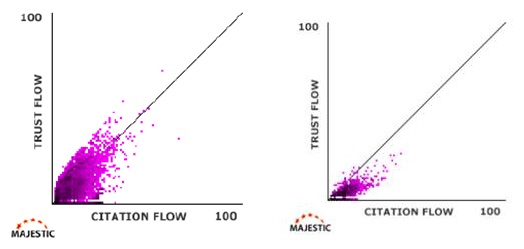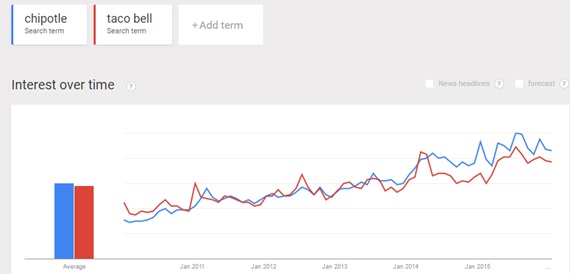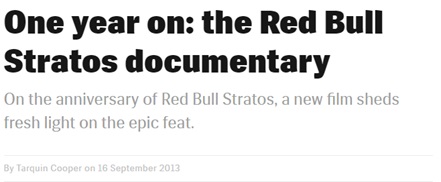
Defining a brand strategy should always be prior to SEO or any other marketing activity. Branding is what dictates the direction that marketing should take, and helps make the right judgement call. In other words, a well curated branding strategy brings purpose and consistency to everything that a brand does. This is why an SEO strategy can only be as good as a brand strategy is. When SEO is built on the foundations of a brand, it is more likely that it will increase the authoritativeness and relevancy, and in turn this will impact brand KPIs.
If we imagine that all the links were acquired naturally, we could say a lot about a brand by looking at its backlinks profile, like the awareness that different campaigns generate, for example. This is the direction that things are taking, Google even posted on their blog recently reminding bloggers to use no follow and disclose relationship when they’re writing a promotional post.
There’s no arguing that this is the only way of approaching links, but how effective is it? Links are an important ranking signal, and brands want to keep up with their competitors. Is branded content enough to get all the links a brand ‘need’ to be on top of their game? And how much does a branded digital PR strategy actually impact links?
I will explore this by comparing the backlink profiles of brands that have a well-defined branded strategy with their main competitors.
Chipotle
Chipotle is known for its mission of delivering food with integrity, and this positioning dictates all of their marketing activities. This strategy had very good results, sales went up, and it generated more awareness, as we can see on this Google Trends image:
It was only in 2014 that there were more searches for ‘Chipotle’ than for ‘Taco Bell’, its main competitor:
Can we also verify this positive trend in Chipotle’s backlink profile? I would expect so but to answer that question, let’s look at their Trust and Citation Flow and Topical Trust Flow:
Taco Bell has a higher Trust Flow than Chipotle, however the latter is getting links from a more diverse set of sources and their topical trust flow are in line with the brand’s strategy.
Something else I’m interested in looking at is the history of the referring domains to see if it reflects what’s been happening with the brand – from their main marketing stunts to any particular situation they had to deal with.
Looking at this graph I would say that it reflects what’s been going on with Chipotle and its main competitor. Chipotle came from behind and got more domains linking to them than Taco Bell in mid 2014/early 2015, however things changed again in mid 2015. In fact, Chipotle faced a few problems in that year, like the E.coli situation, and this might help to explain what we see here.
Let’s move to another example:
Domino’s
Domino’s not only changed its product (improved the quality of their pizzas) back in 2009 but it also changed its communication strategy and fully embraced digital. This impacted sales positively, and gave the brand a place on tops like the most loved brands by youth in the UK. Can we get any insights about this based on their backlink profile?
Looking at the Trust and Citation Flow, Domino’s is clearly ahead of its competitors in the UK, and it also has a bigger number of domains linking to their website.
Before 2013, Domino’s had roughly the same number of referring domains than Pizza Hut, however this situation changed in early 2014 and we see the brand getting the biggest number of referring domains more frequently, possibly due to Domino’s marketing efforts.
Let’s look at a last example:
Red Bull
This time I will look at a brand that creates a lot of buzz quite frequently, Red Bull, to see if the links that they get might be related to their content strategy. For consistency purposes, I will compare this brand with its main competitor, Monster Energy.
Looking at the referring domains for both brands, we see that Red Bull has more peaks than Monster Energy, so I will make the assumption that those are not due to an industry trend but to Red Bull activities. Multiple things can explain those peaks, but I would expect some correlation with their content strategy. The biggest peak happens around September 2013 so I did a time framed search to see if there was anything going on at that time that might explain this, and this is what I found:
Around September 2013, Red Bull released a documentary about one of their most popular campaigns, the Strato Jump, and this probably led to more websites linking to them.
Conclusion
A good brand is one that knows who it is talking to, is consistent and knows how to get the message across. If everything works well, when a brand launches a new campaign, this will have an effect on brand KPIs like brand awareness, word of mouth, sales, and it will generate more links.
The purpose here was to explore if a branded strategy can impact a brand’s backlinks profile. There’s only so much we can say by looking at 3 examples, however I believe that we can see some correlation here. A branded strategy doesn’t necessarily mean a higher Trust Flow but it can impact the number of links a brand gets and their relevancy, and we can always expect that to influence the Trust Flow positively. Any marketing team can match the content plan against its backlink profile to analyse if there’s any correlation between campaigns and links, and do the same thing for their competitors, this will give some insight about how people react to different campaigns and what generates more awareness, which can be very useful to any brand working on its content strategy.
——————————————————————————————————————————————————
Ana Verissimo is the head of brand of 90 Digital, a digital marketing agency with SEO at its core.
- How is branding affecting your backlink profile? - April 11, 2016














May I know, What factors you people see to select as a Brand?
April 18, 2016 at 10:08 amDefining a brand strategy should always much prior to search engines and all other marketing activity. Branding is relate in dedicating the direction marketing with right judgement. Well curated branding strategy will bring the purpose and consistency.
April 20, 2016 at 1:52 pmMost of them failed to make a connection. Webmaster tool will accomplish the branding strategy of google algorithm and indexing work will recognize the measure of popularity of a brand. It is very much important to understand the google algorithm which has been designed to push the webmaster creation of user-centric.
April 28, 2016 at 8:30 am